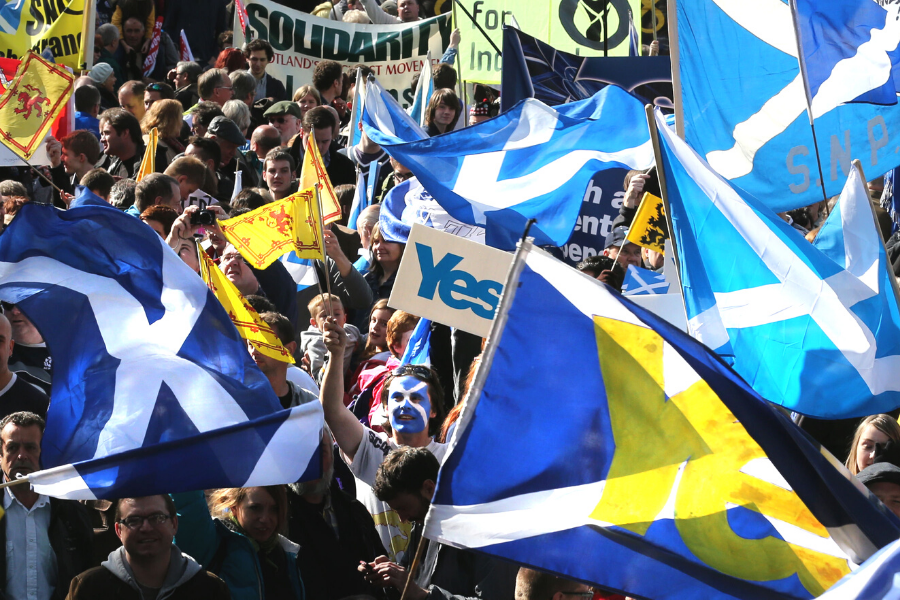
A NEW survey has shown that more than half of people north of the Border believe Scotland should be an independent nation.
The figures, based on a survey carried out in 2021, show that 52% of those asked back independence, while support for devolution has dropped to 38%.
Senior research fellow at the National Centre for Social Research Sir John Curtice said the survey “can show how attitudes have shifted over a long time period”.
Below, we look into five key reasons which might explain why support is at an all-time high.
Brexit
In 2016, 62% of voters in Scotland voted to remain in the EU. Not a single council area across the country voted for Brexit, but it was ultimately still pushed through.
In a different survey, conducted in 2020, more than two-thirds of 1127 poll participants said that they regretted the result.
Since the UK finally left the EU in January 2020, Scotland has faced a number of consequences as a result including food supply issues and staff shortages owing to the ending of the freedom of movement.
Universities have also suffered with figures showed the percentage of students who live in Europe accepted to study in Scotland dropped by 56% in 2021 when compared to 2020.
A Scottish Government report released last year said many of the problems envisaged at the time of the vote were “starting to crystalise”.
It stated: “We can already say with confidence that across a wide range of areas, Brexit is having a tangible and harmful impact on the quality of life of the people of Scotland and on Scottish businesses.
How the pandemic was handled
It was clear from their daily briefings that Nicola Sturgeon spoke with far more clarity and assurance than Boris Johnson ever did about the pandemic.
Stats would suggest that, based on their respective handlings of the Covid-19 pandemic, people in Scotland have far more faith in Sturgeon than Johnson as a leader.
A survey commissioned by the University of Bristol and King’s College London found that 55% of the Scottish public said their overall experience of the pandemic had decreased their level of trust in the UK Government.
On top of this, the same survey showed 72% of people in Scotland say they didn’t trust Boris Johnson on issues related to Covid-19.
By contrast, two-thirds of people across the country were trusting of the First Minister when it came to the pandemic.
Boris Johnson
It’s no secret that the former prime minister was not well-loved north of the Border. He once left via the back door of Bute House following a meeting with the First Minister.
He once described devolution as a “disaster” and said that it was Tony Blair’s “biggest mistake”.
Going back to 2004, although Johnson didn’t write this, he published a poem which described Scots as a “verminous race” while editor of Spectator magazine.
Is it any wonder support for independence is now at an all-time high following a man who spoke of Scotland with such contempt serving as prime minister?
Oh and let’s not forget this quote: “A pound spent in Croydon is far more of value to the country, on a strict utilitarian calculus, than a pound spent in Strathclyde.”
General Contempt
Dismissiveness of Scotland is nothing new. The new Prime Minister recently described Nicola Sturgeon as “an attention seeker” who was best ignored.
Johnson’s previous comments on devolution only served to reenforce the clear contempt Tory governments have had for Scotland.
A Sunday Times report from 2021 said British diplomats had been told to stop referring to the “four nations of the UK”.
The SNP hit out at the revelations, saying the change in rhetoric would show promises of a Union of equals have “turned to dust”.
Moreover, the current Prime Minister once began a two-day trip to Scotland by claiming Scottish businesses were “excited” about Brexit.
Upon announcing a new green energy scheme in Scotland, she told STV how it would lead to the creation of 1.2 million jobs in England.
Truss merely laughed the comment off and said she would get a Scotland specific figure “for her next discussion”.
Lack of Credible Opposition
Throughout her time as First Minister, Nicola Sturgeon has faced off against Kezia Dugdale, Richard Leonard and Anas Sarwar amongst others as leaders of Scottish Labour.
Meanwhile, the leader of the Scottish Conservatives last year said he “didn’t know why” he failed to declare more than £28,000 in salaries whilst in May 2021, nearly 1000 people signed a petition demanding that the Scottish Conservative Leader resign because he has too many jobs.
A poll conducted in September of last year showed 51% of people backed the SNP to be the future of Holyrood whilst just 21% of voters said they would cast their ballot for the Scottish Tories.
Scottish Labour saw the worst result of the three biggest parties with Scottish Parliament constituency voting intentions at 18% of those surveyed.







